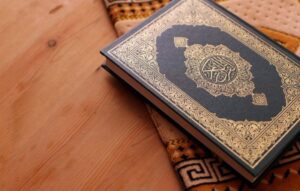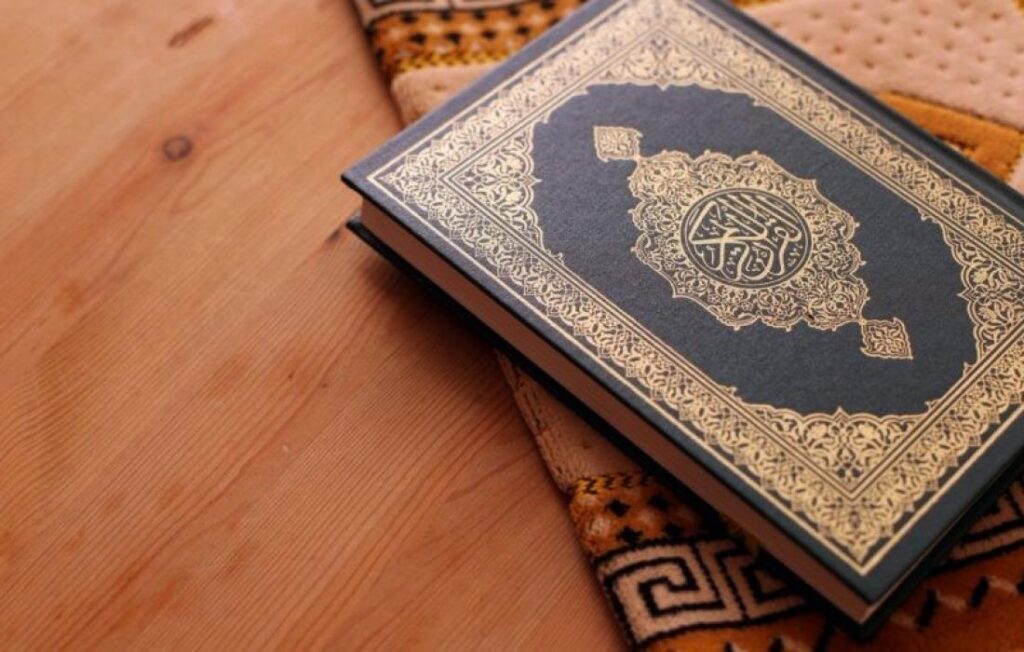Integration between men and women in Islam

- God wanted to draw us to the issue of integration between men and women, as the issue of integration between night and day.
- No one can say that night and day are antagonistic, but rather they are complementary and complement each other. Also, man and woman were created by God Almighty as complementary and not antagonistic.
- A man has his job to seek livelihood, take care of his wife and children, and provide them with the means of life. The woman has her duty to take care of the house and to have children. And it is a residence for the husband when he returns home tired of the movement of life, she receives him with a smile that wipes away the misery of the day and finds everything he needs in his house prepared, and that is why God Almighty said: )وَمِنْ آَيَاتِهِ أَنْ خَلَقَ لَكُمْ مِنْ أَنْفُسِكُمْ أَزْوَاجًا لِتَسْكُنُوا إِلَيْهَا وَجَعَلَ بَيْنَكُمْ مَوَدَّةً وَرَحْمَةً إِنَّ فِي ذَلِكَ لَآَيَاتٍ لِقَوْمٍ يَتَفَكَّرُونَ(
Women in Holy Qur’an
In the Noble Qur’an there are women who have mentioned a definition or a denial, an explanation or an ambiguity, a statement or an allusion, a reminder or an implication, and among them are:
- Eve: It was mentioned in the verse – the Most High -: {وَقُلْنَا يَا آَدَمُ اسْكُنْ أَنْتَ وَزَوْجُكَ الْجَنَّةَ} [البقرة: 35].Eve was created from Adam’s rib – peace be upon him. It was called by this name; Because it was created from a living thing.
- Mariam: It was mentioned in the Almighty’s saying:{وَاذْكُرْ فِي الْكِتَابِ مَرْيَمَ إِذِ انْتَبَذَتْ مِنْ أَهْلِهَا مَكَانًا شَرْقِيًّا} [مريم: 16]
- Lot’s wife: She was mentioned in the Almighty’s saying: {ضَرَبَ اللَّهُ مَثَلًا لِلَّذِينَ كَفَرُوا اِمْرَأَةَ نُوحٍ وَامْرَأَةَ لُوطٍ} [التحريم: 10].
Her betrayal was in religion, and she was not in obscenity, Where she was showing her people the hospitality of Lot – peace be upon him. - Ibrahim’s wife: Sarah, the daughter of his paternal uncle, peace and blessings be upon him, the mother of Isaak. She was mentioned in the Almighty’s saying:{وَامْرَأَتُهُ قَائِمَةٌ فَضَحِكَتْ فَبَشَّرْنَاهَا بِإِسْحَاقَ وَمِنْ وَرَاءِ إِسْحَاقَ يَعْقُوبَ}
What does the quran say about women?
The Noble Qur’an came to countries of the whole world with legitimate rights for women that were not preceded by the constitution of Sharia or the constitution of religion.
And more generous than that for her, he raised her from humiliation to the status of a human being counted from the offspring of Adam and Eve, free from the abomination of Satan and the defilement of animals.
And greater than all the legal rights that women gained from the Holy Qur’an for the first time, it lifted the curse of eternal sin and the stigma of the despised body, Each of the Couples has been tempted by Satan and deserves forgiveness through repentance and remorse: (فَأَزَلَّهُمَا الشَّيْطَانُ عَنْهَا فَأَخْرَجَهُمَا مِمَّا كَانَا فِيهِ وَقُلْنَا اهْبِطُواْ بَعْضُكُمْ لِبَعْضٍ عَدُوٌّ وَلَكُمْ فِي الأَرْضِ مُسْتَقَرٌّ وَمَتَاعٌ إِلَى حِينٍ).
We find that the Noble Qur’an describes the woman as one of the two parts of the human body and says: (يَا أَيُّهَا النَّاسُ إِنَّا خَلَقْنَاكُمْ مِنْ ذَكَرٍ وَأُنْثَى وَجَعَلْنَاكُمْ شُعُوبًا وَقَبَائِلَ لِتَعَارَفُوا إِنَّ أَكْرَمَكُمْ عِنْدَ اللَّهِ أَتْقَاكُمْ إِنَّ اللَّهَ عَلِيمٌ خَبِيرٌ)
The female, like the male, constitutes the basis of society without any difference between them. The Qur’an refuses for a Muslim to grieve for the offspring of daughters and to receive their birth with sadness and frowns: ( وَإِذَا بُشِّرَ أَحَدُهُمْ بِالْأُنْثَى ظَلَّ وَجْهُهُ مُسْوَدًّا وَهُوَ كَظِيمٌ )
A person’s care for his father and mother is equal, as is his care for his sons and daughters, and mothers may be mentioned by mentioning in this regard ( وَوَصَّيْنَا الْإِنْسَانَ بِوَالِدَيْهِ إِحْسَانًا حَمَلَتْهُ أُمُّهُ كُرْهًا وَوَضَعَتْهُ كُرْهًا وَحَمْلُهُ وَفِصَالُهُ ثَلَاثُونَ شَهْرًا حَتَّى إِذَا بَلَغَ أَشُدَّهُ وَبَلَغَ أَرْبَعِينَ سَنَةً قَالَ رَبِّ أَوْزِعْنِي أَنْ أَشْكُرَ نِعْمَتَكَ الَّتِي أَنْعَمْتَ عَلَيَّ وَعَلَى وَالِدَيَّ وَأَنْ أَعْمَلَ صَالِحاً تَرْضَاهُ وَأَصْلِحْ لِي فِي ذُرِّيَّتِي إِنِّي تُبْتُ إِلَيْكَ وَإِنِّي مِنْ الْمُسْلِمِينَ)
Women and family decision
-
The right to choose a partner
The Qur’anic verses that can benefit from a woman’s ability to control the decision to create a family are: The Almighty said:(وَإِذَا طَلَّقْتُمُ النِّسَاءَ فَبَلَغْنَ أَجَلَهُنَّ فَلَا تَعْضُلُوهُنَّ أَنْ يَنْكِحْنَ أَزْوَاجَهُنَّ إِذَا تَرَاضَوْا بَيْنَهُمْ بِالْمَعْرُوفِ ذَلِكَ يُوعَظُ بِهِ مَنْ كَانَ مِنْكُمْ يُؤْمِنُ بِاللَّهِ وَالْيَوْمِ الْآخِرِ ذَلِكُمْ أَزْكَى لَكُمْ وَأَطْهَرُ وَاللَّهُ يَعْلَمُ وَأَنْتُمْ لَا تَعْلَمُونَ)
2. A woman’s right to separate from her husband
The Almighty said: (الطَّلاقُ مَرَّتَانِ فَإِمْسَاكٌ بِمَعْرُوفٍ أَوْ تَسْرِيحٌ بِإِحْسَانٍ وَلا يَحِلُّ لَكُمْ أَنْ تَأْخُذُوا مِمَّا آتَيْتُمُوهُنَّ شَيْئاً إِلاّ أَنْ يَخَافَا أَلاَّ يُقِيمَا حُدُودَ اللَّهِ فَإِنْ خِفْتُمْ أَلاَّ يُقِيمَا حُدُودَ اللَّهِ فَلا جُنَاحَ عَلَيْهِمَا فِيمَا افْتَدَتْ بِهِ تِلْكَ حُدُودُ اللَّهِ فَلا تَعْتَدُوهَا وَمَنْ يَتَعَدَّ حُدُودَ اللَّهِ فَأُولَئِكَ هُمُ الظَّالِمُونَ)
3. Women’s individual property right
Islam acknowledged for women complete individual ownership, and made this an inherent right for her, which is one of her civil rights.
Hence, Islam recognized her full civil personality and absolute freedom to dispose of her money and property, and her right, like men, to have an independent financial liability, to achieve her self entity.
And that from here there was equality in the right of ownership and earning between men and women, and to this fact the Holy Qur’an indicated in equal terms: “لِّلرِّجَالِ نَصيِبٌ مِّمَّا تَرَكَ الْوَالِدَانِ وَالأَقْرَبُونَ وَلِلنِّسَاء نَصِيبٌ مِّمَّا تَرَكَ الْوَالِدَانِ وَالأَقْرَبُونَ مِمَّا قَلَّ مِنْهُ أَوْ كَثُرَ نَصِيبًا مَّفْرُوضًا” Thus, the wife has the right to conclude all legal actions, and manage her money in the ways she chooses, and the husband has no control over his wife’s money. It is also forbidden for the husband to take anything from his wife’s money without her consent.
Join our Quran Courses to learn Quran Arabic and Tajweed online



